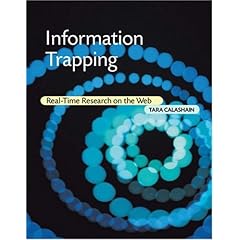Information Trapping - IFTF's Summer Book

At the July meeting of the Information and the Future Task Force we will be discussing Tara Calishain's book Information Trapping: Real-Time Research on the Web.
IFTF has been exploring emerging technologies and resources that are available on the web and this book will help us think about how to effectively use these tools to conduct research. The book is full of tips, examples, and reviews of different services with the goal of performing research that is "manageable but complete." I haven't yet read the chapters on organizing email but I hear that alone is "worth the price of the book"
Calishain has published several other books about online research and maintains the ResearchBuzz blog. I believe this book will help us think about the similarities and differences in our approach to research as we move into the digital age.
Labels: Calishain, information literacy, Infromation Trapping






